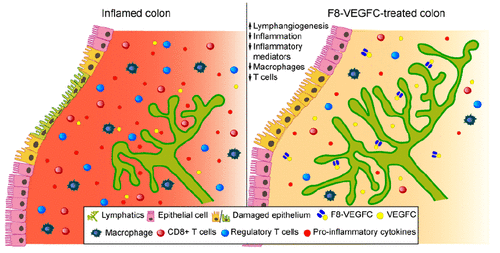当前位置:
X-MOL 学术
›
ACS Pharmacol. Transl. Sci.
›
论文详情
Our official English website, www.x-mol.net, welcomes your
feedback! (Note: you will need to create a separate account there.)
Antibody-Mediated Delivery of VEGFC Ameliorates Experimental Chronic Colitis.
ACS Pharmacology & Translational Science ( IF 4.9 ) Pub Date : 2019-08-15 , DOI: 10.1021/acsptsci.9b00037 Carlotta Tacconi 1 , Simon Schwager 1 , Nikola Cousin 1 , Davor Bajic 1 , Marko Sesartic 1 , John P Sundberg 2 , Dario Neri 1 , Michael Detmar 1
ACS Pharmacology & Translational Science ( IF 4.9 ) Pub Date : 2019-08-15 , DOI: 10.1021/acsptsci.9b00037 Carlotta Tacconi 1 , Simon Schwager 1 , Nikola Cousin 1 , Davor Bajic 1 , Marko Sesartic 1 , John P Sundberg 2 , Dario Neri 1 , Michael Detmar 1
Affiliation

|
Crohn’s disease (CD) and ulcerative colitis (UC) are two distinct forms of inflammatory bowel disease (IBD) characterized by an expanded lymphatic network with impaired functionality both in mouse models and in human patients. In this study, we investigated whether targeted delivery of the pro-lymphangiogenic vascular endothelial growth factor C (VEGFC) to the site of inflammation may represent a new, clinically feasible strategy for treating IBD. To achieve targeting of inflamed tissue, we developed a fusion protein consisting of human VEGFC fused to the F8 antibody (F8-VEGFC), which specifically binds to the extradomain A (EDA) of fibronectin, a spliced isoform almost exclusively expressed in inflamed tissues. The therapeutic activity of intravenously administered F8-VEGFC, compared to a targeted construct lacking VEGFC (F8-SIP), was investigated in a mouse model of dextran sodium sulfate (DSS)-induced colitis. The presence of EDA fibronectin was detected in both human and mouse inflamed colon tissue. Biodistribution studies of radiolabeled F8-VEGFC revealed a specific accumulation of the antibody in the colon of DSS-administered mice, as compared to an untargeted VEGFC fusion protein (KSF-VEGFC) (binding the irrelevant hen egg lysozyme antigen). Systemic treatment with F8-VEGFC significantly reduced the clinical and histological signs of inflammation, expanded the lymphatic vascular network, reduced the density of immune cells, and also decreased the expression of inflammatory cytokines in the inflamed colon. Overall, these results reveal that administration of F8-VEGFC represents a novel and promising approach for the treatment of IBD.
中文翻译:

抗体介导的VEGFC的递送改善了实验性慢性结肠炎。
克罗恩氏病(CD)和溃疡性结肠炎(UC)是炎性肠病(IBD)的两种不同形式,其特征是在小鼠模型和人类患者中淋巴管网络扩大,功能受损。在这项研究中,我们调查了将促淋巴管生成的血管内皮生长因子C(VEGFC)靶向递送至炎症部位是否可能代表一种新的,临床上可行的治疗IBD的策略。为了达到发炎组织的靶向性,我们开发了一种融合蛋白,该蛋白由与F8抗体(F8-VEGFC)融合的人VEGFC组成,该蛋白与纤连蛋白(一种几乎只在发炎组织中表达的剪接同种型)特异性结合的外域A(EDA)。与缺乏VEGFC的靶向构建体(F8-SIP)相比,静脉内施用F8-VEGFC的治疗活性,在右旋糖酐硫酸钠(DSS)诱导的结肠炎的小鼠模型中进行了研究。在人和小鼠发炎的结肠组织中均检测到EDA纤连蛋白的存在。放射性标记的F8-VEGFC的生物分布研究表明,与未靶向的VEGFC融合蛋白(KSF-VEGFC)(结合无关的鸡蛋溶菌酶抗原)相比,DSS给予的小鼠结肠中抗体的特异性积累。F8-VEGFC的全身治疗显着降低了炎症的临床和组织学征象,扩大了淋巴管网络,降低了免疫细胞的密度,还降低了发炎结肠中炎性细胞因子的表达。总体而言,这些结果表明,F8-VEGFC的给药代表了一种治疗IBD的新颖且有希望的方法。
更新日期:2019-08-15
中文翻译:

抗体介导的VEGFC的递送改善了实验性慢性结肠炎。
克罗恩氏病(CD)和溃疡性结肠炎(UC)是炎性肠病(IBD)的两种不同形式,其特征是在小鼠模型和人类患者中淋巴管网络扩大,功能受损。在这项研究中,我们调查了将促淋巴管生成的血管内皮生长因子C(VEGFC)靶向递送至炎症部位是否可能代表一种新的,临床上可行的治疗IBD的策略。为了达到发炎组织的靶向性,我们开发了一种融合蛋白,该蛋白由与F8抗体(F8-VEGFC)融合的人VEGFC组成,该蛋白与纤连蛋白(一种几乎只在发炎组织中表达的剪接同种型)特异性结合的外域A(EDA)。与缺乏VEGFC的靶向构建体(F8-SIP)相比,静脉内施用F8-VEGFC的治疗活性,在右旋糖酐硫酸钠(DSS)诱导的结肠炎的小鼠模型中进行了研究。在人和小鼠发炎的结肠组织中均检测到EDA纤连蛋白的存在。放射性标记的F8-VEGFC的生物分布研究表明,与未靶向的VEGFC融合蛋白(KSF-VEGFC)(结合无关的鸡蛋溶菌酶抗原)相比,DSS给予的小鼠结肠中抗体的特异性积累。F8-VEGFC的全身治疗显着降低了炎症的临床和组织学征象,扩大了淋巴管网络,降低了免疫细胞的密度,还降低了发炎结肠中炎性细胞因子的表达。总体而言,这些结果表明,F8-VEGFC的给药代表了一种治疗IBD的新颖且有希望的方法。











































 京公网安备 11010802027423号
京公网安备 11010802027423号